Recruiters and hiring managers frequently face the challenge of finding the perfect Chief of Staff. This role is critical, serving as a strategic partner to senior executives and significantly impacting an organization's workflow and decision-making processes. Companies often misstep by not clearly defining the responsibilities and essential skills required for the role, leading to mismatches and inefficiencies.
In this article, we provide a comprehensive guide on hiring a Chief of Staff. From outlining their roles and responsibilities to crafting effective job descriptions and understanding the hiring process, we'll cover various aspects to help you make an informed hiring decision. Additionally, you can explore our Chief of Staff interview questions for further insights.
Table of contents
Why Hire a Chief of Staff?
A Chief of Staff can be a game-changer for your organization. They act as a strategic partner to the CEO, managing high-level projects and streamlining operations. Consider hiring one if you're facing challenges in executive time management or need help aligning teams across departments.
Here are some scenarios where a Chief of Staff can add value:
- Coordinating complex, cross-functional initiatives
- Improving communication between leadership and staff
- Managing the CEO's schedule and priorities
Before committing to a full-time hire, assess if your organization's size and complexity warrant the role. For smaller companies or those testing the waters, starting with a consultant or interim Chief of Staff might be a good first step.
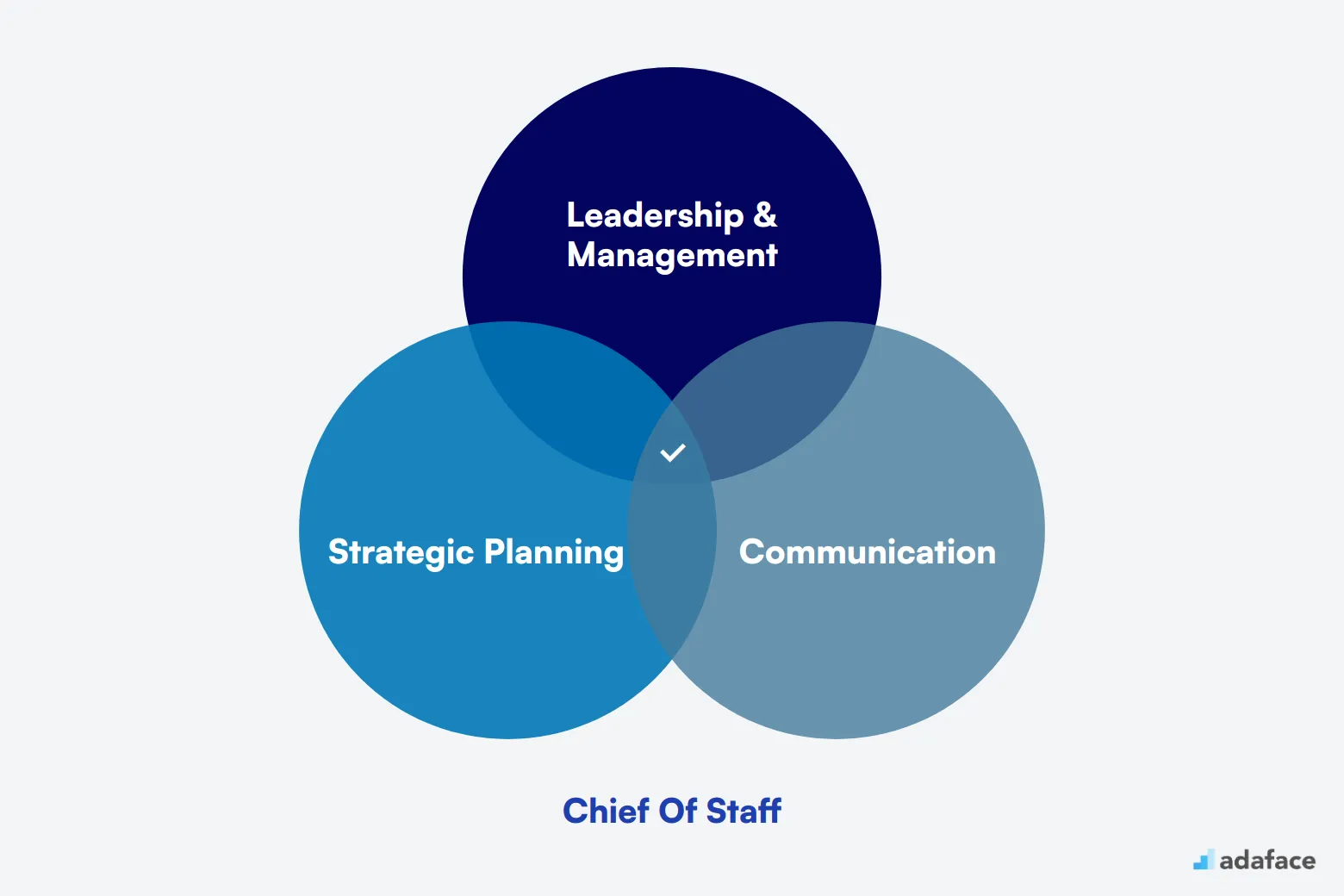
What Does a Chief of Staff Do?
A Chief of Staff acts as the right hand to a senior executive, typically the CEO, managing their priorities and streamlining operations. They serve as a strategic partner, handling high-level projects, coordinating between departments, and ensuring the executive's vision is effectively communicated and implemented across the organization.
The day-to-day responsibilities of a Chief of Staff include:
- Managing the executive's schedule and priorities
- Overseeing critical initiatives and special projects
- Facilitating communication between departments and stakeholders
- Preparing briefings, reports, and presentations for the executive
- Attending meetings on behalf of the executive when necessary
- Analyzing data and providing strategic insights
- Acting as a sounding board for ideas and decision-making
- Resolving conflicts and addressing issues that arise within the organization
Chief Of Staff Hiring Process
The hiring process for a Chief of Staff role typically spans 4-6 weeks. Here's a quick overview:
- Define the role: Carefully outline the job description and required skills.
- Source candidates: Post the job opening on relevant job boards and leverage your professional network.
- Screen resumes: Shortlist candidates based on their qualifications and experience.
- Conduct assessments: Use skills assessments to evaluate candidates' abilities.
- Interview process: Schedule interviews with the shortlisted candidates, including behavioral and situational questions.
- Make an offer: After thorough evaluation, extend an offer to the top candidate.
The entire process can take 1-2 months, depending on the urgency and availability of suitable candidates. Let's dive into the details of each step.
Skills and qualifications to look for in a Chief Of Staff
Getting the candidate profile right for a Chief Of Staff can be tricky. The role is dynamic and requires a mix of leadership and strategic thinking. Recruiters might often overlook the balance between required and preferred skills. Make sure to distinguish clearly between what's required and what's a nice-to-have.
Start with the required qualifications: a Bachelor's degree in Business or a related field, coupled with 5+ years of experience in a leadership capacity. It's important the candidate can manage projects and lead cross-functional teams efficiently.
Preferred qualifications can really set a candidate apart. An MBA or advanced degree, along with experience in strategic planning, can be helpful. Familiarity with corporate governance and proficiency in project management tools can also be advantageous.
A strong Chief Of Staff will excel in leadership and management, strategic planning, and communication. These core skills are supported by a mix of team building, public speaking, and data interpretation. For more tips on building the right candidate profile, explore our skills assessment tools.
| Required skills and qualifications | Preferred skills and qualifications |
|---|---|
| Bachelor's degree in Business, Management, or a related field | MBA or other advanced degree |
| 5+ years of experience in a leadership or executive support role | Experience in strategic planning and implementation |
| Proven ability to manage projects and lead cross-functional teams | Familiarity with corporate governance and board management |
| Exceptional communication and interpersonal skills | Proficiency in using project management and collaboration tools |
| Strong analytical and problem-solving abilities | Experience in industry-specific roles or sectors |
How to write a Chief Of Staff job description?
Once you have a clear candidate profile, the next step is to translate that into a job description that attracts the right talent. A well-crafted job description will set the stage for finding the ideal Chief Of Staff who can drive your organization forward.
• Highlight key responsibilities and impact: Clearly outline the main duties of the Chief Of Staff, including strategic planning, project management, and stakeholder engagement. This will attract candidates who understand the role's significance in supporting leadership and driving organizational goals.
• Balance technical skills with soft skills: While listing qualifications like experience in project management and familiarity with data analysis tools is important, also emphasize soft skills such as leadership, communication, and problem-solving. These traits are essential for navigating the complexities of the role and working effectively with diverse teams.
• Showcase unique company attributes: Highlight what your company offers, such as a supportive culture, growth opportunities, or innovative projects. This will help differentiate your job listing and attract candidates who resonate with your organizational values and mission. Consider using a detailed Chief Of Staff job description for inspiration.
Top Platforms to Hire Chief of Staff
With a well-crafted job description in hand, it's time to post your Chief of Staff opening on job listing sites to attract qualified candidates. The right platform can significantly impact the quality and quantity of applicants you receive. Let's explore some top options for finding your ideal Chief of Staff.
LinkedIn Jobs
Ideal for posting full-time Chief of Staff positions. Offers wide reach and allows detailed job descriptions with company profiles.

Indeed
Versatile platform for posting Chief of Staff roles of all types. Offers free job postings and reaches a large candidate pool.

Glassdoor for Employers
Excellent for corporate Chief of Staff roles. Provides employer branding opportunities and reaches candidates who research company cultures.
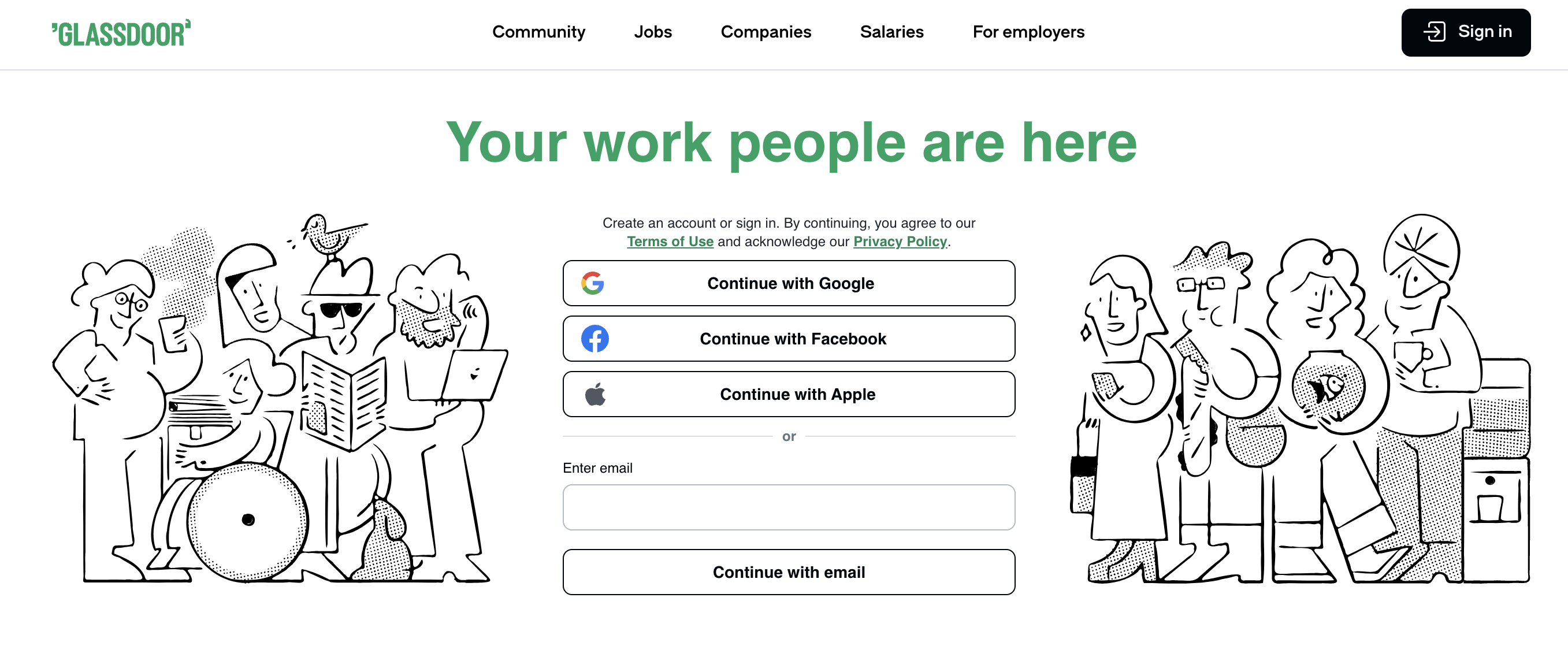
Beyond these popular sites, there are specialized platforms catering to specific needs. ExecThread and The Ladders are excellent for executive and high-salary Chief of Staff roles, while FlexJobs is perfect for remote positions. For tech-focused roles, Dice is a go-to platform, and CrunchBoard is ideal for startups. Each platform offers unique features to help you find the best fit for your organization's Chief of Staff position.
Keywords to Look for in Chief of Staff Resumes
Resume screening is a critical step in hiring a Chief of Staff. It helps you quickly identify candidates with the right skills and experience before investing time in interviews.
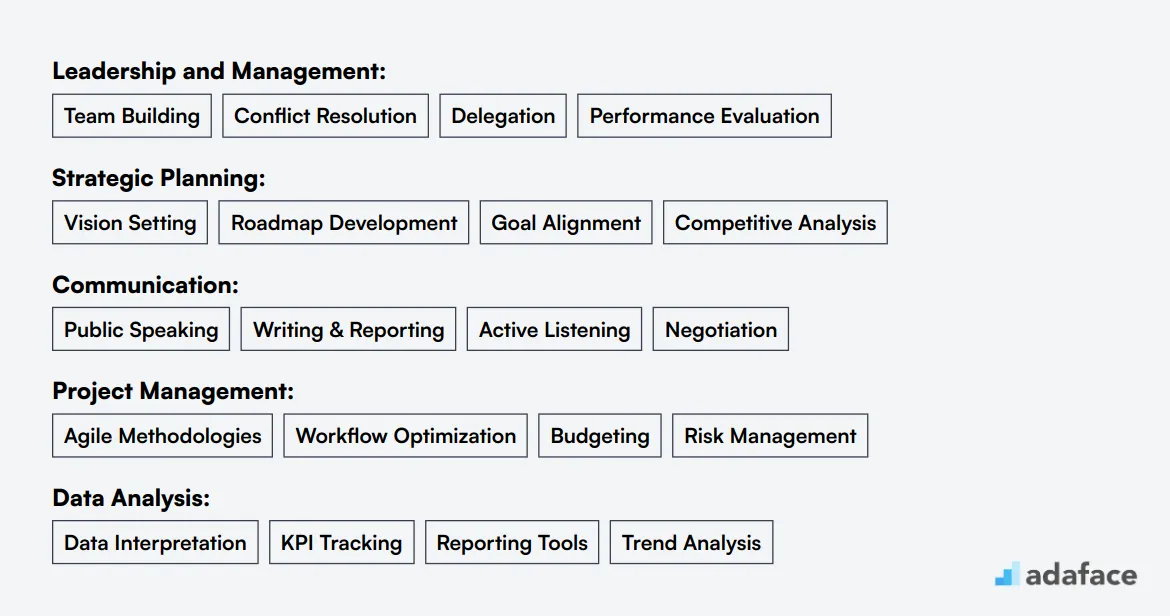
When manually screening resumes, focus on key terms like 'strategic planning', 'project management', and 'executive support'. Look for specific examples of leadership experience and cross-functional team management.
To streamline the process, consider using AI-powered tools or language models. These can help you quickly scan multiple resumes for relevant keywords and experiences, saving time in your hiring process.
Here's a sample prompt for AI-assisted resume screening:
TASK: Screen resumes for Chief of Staff role
INPUT: Resumes
OUTPUT: For each resume, provide:
- Candidate name and email
- Matching keywords
- Score (out of 10)
- Recommendation
- Shortlist decision (Yes/No/Maybe)
KEYWORDS:
- Strategic planning
- Project management
- Executive support
- Team leadership
- Communication skills
- Business degree
- 5+ years experience
Recommended Skills Tests for Chief of Staff Candidates
Skills tests are valuable tools for assessing Chief of Staff candidates beyond their resumes. They provide objective data on a candidate's abilities and help ensure you're making an informed hiring decision. Here are five key tests we recommend for evaluating potential Chiefs of Staff:
Business Analyst Test: This business analyst assessment evaluates a candidate's ability to analyze complex business problems, interpret data, and propose strategic solutions. It's particularly relevant for Chiefs of Staff who often need to bridge gaps between different departments and translate high-level goals into actionable plans.
Leadership Psychometric Test: A leadership assessment helps gauge a candidate's leadership style, decision-making skills, and ability to motivate teams. This is critical for Chiefs of Staff who must often lead cross-functional projects and influence without direct authority.
Problem Solving Test: Chiefs of Staff frequently encounter complex, multi-faceted challenges. A problem-solving assessment evaluates a candidate's ability to think critically, analyze information from various sources, and develop effective solutions.
Communication Test: Strong communication skills are a must for any Chief of Staff. A communication assessment can help evaluate a candidate's ability to articulate ideas clearly, listen effectively, and adapt their communication style to different audiences and situations.
Project Management Test: Chiefs of Staff often oversee major initiatives and need to keep multiple projects on track. A project management assessment can help evaluate a candidate's ability to plan, execute, and monitor complex projects while managing resources and stakeholders effectively.
Case Study Assignments for Hiring Chief of Staff
Case study assignments can be valuable tools for assessing Chief of Staff candidates. However, they come with drawbacks such as lengthy completion times, lower candidate participation rates, and the risk of losing top talent due to the time investment required. Despite these challenges, well-designed case studies can provide insights into a candidate's problem-solving abilities and strategic thinking.
Strategic Planning Scenario: Present candidates with a fictional company facing growth challenges. Ask them to develop a 12-month strategic plan addressing key issues like market expansion, team restructuring, and resource allocation. This case study tests their ability to think critically and create comprehensive strategies.
Crisis Management Simulation: Create a scenario where the company is dealing with a major public relations crisis. Candidates must outline a crisis management plan, including internal and external communication strategies, stakeholder management, and steps to mitigate long-term damage. This assignment evaluates their decision-making skills under pressure and communication abilities.
Executive Team Alignment Project: Describe a situation where there's misalignment among C-suite executives on a key business initiative. Ask candidates to propose a plan for facilitating discussions, finding common ground, and moving the project forward. This case study assesses their leadership and interpersonal skills in managing high-level relationships.
How to structure the interview stage for hiring Chief Of Staffs
Once candidates have excelled in the skills tests, the next phase is conducting technical interviews to assess their hard skills. Skills tests efficiently filter out unfit candidates, but interviews are where you identify the best fit for the role. The interview stage is critical in understanding the candidate's ability to perform the duties of a Chief of Staff effectively.
During the interview, consider asking questions like: 'Can you describe a time when you had to manage a complex project?' to evaluate project management skills. 'How do you prioritize tasks when managing multiple responsibilities?' assesses their organizational skills. 'Describe a situation where you had to communicate a difficult decision?' checks their communication abilities. 'How do you handle conflicts within a team?' is a way to understand their conflict resolution skills. Lastly, 'What strategies do you use for effective stakeholder management?' gauges their ability to manage key relationships. For more on skills to look for in a Chief of Staff, refer to our skills required for Chief of Staff page.
What's the Cost of Hiring a Chief of Staff?
The cost of hiring a Chief of Staff can vary widely based on factors like location, experience, and company size. In the United States, the average salary for this role is around $134,627 per year. However, the range can be quite broad, starting from about $70,000 and reaching up to $213,000 for top-tier positions.
Remember, salary is just one part of the total compensation package. Benefits, bonuses, and stock options can significantly increase the overall cost. It's also worth considering that in high-cost areas like Silicon Valley, salaries tend to be higher than the national average.
Chief Of Staff Salary in the United States
The average salary for a Chief of Staff in the United States is approximately $134,627 per year. Salaries can range from around $70,365 at the lower end to as high as $213,523 at the top end, depending on factors like location and experience. For instance, in cities like Palo Alto, CA, the median salary can reach up to $164,726, while in Hartford, CT, it may hover around $93,562.
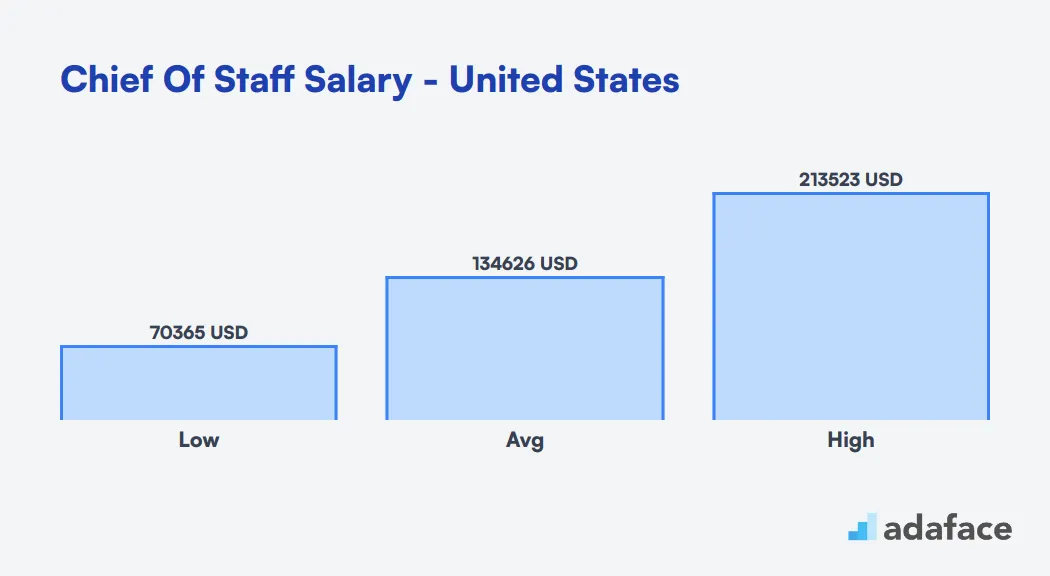
Chief of Staff Salary in Australia
In Australia, Chief of Staff salaries vary across major cities. The national average salary ranges from AUD 111,135 to AUD 213,423, with a median of AUD 154,009.
Canberra offers the highest median salary at AUD 151,101, followed closely by Sydney at AUD 148,433. Melbourne has a lower median of AUD 102,658, reflecting regional differences in compensation for this role.
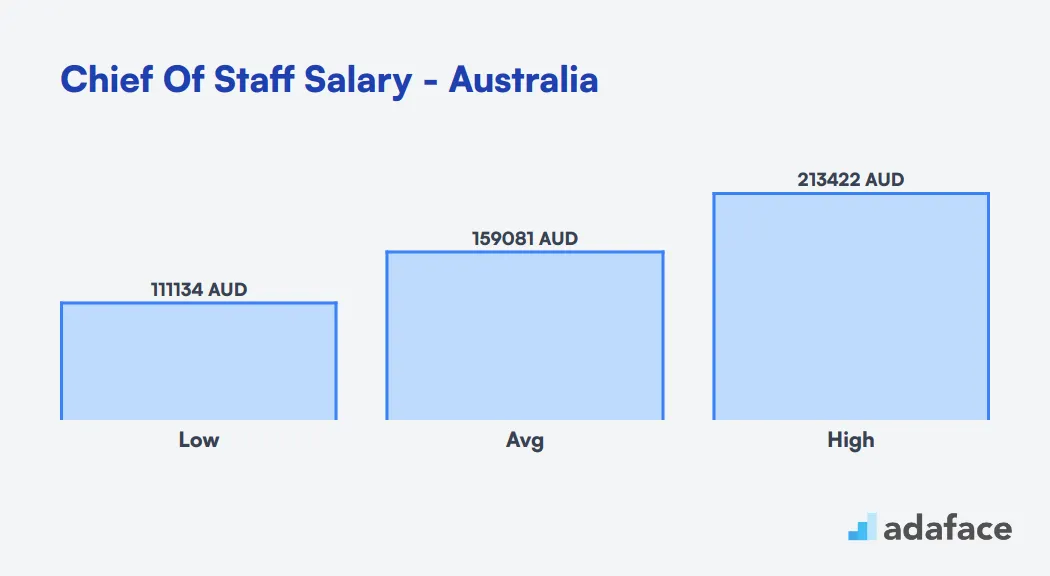
What's the difference between a Chief of Staff and an Executive Assistant?
Many people confuse the roles of Chief of Staff and Executive Assistant due to their proximity to top leadership. While both positions support executives, they differ significantly in scope, authority, and strategic involvement.
A Chief of Staff is deeply involved in high-level strategy and decision-making, often managing teams and projects with a broad organizational impact. They typically have significant autonomy and collaborate directly with the C-suite. In contrast, an Executive Assistant focuses primarily on supporting the executive's daily needs, with limited strategic input and decision-making power.
The career trajectories for these roles also differ. A Chief of Staff position often requires 5-10+ years of leadership experience and an advanced degree, potentially leading to executive roles. An Executive Assistant role typically needs 2-5 years of administrative experience and a bachelor's degree, possibly leading to operations or administrative management positions.
When hiring for these positions, it's crucial to understand these distinctions to ensure you're bringing the right talent on board for your organization's needs.
| Chief of Staff | Executive Assistant | |
|---|---|---|
| Strategic Involvement | High-level strategy and decision-making | Limited strategic input |
| Scope of Responsibilities | Broad organizational impact | Focused on executive's needs |
| Team Management | Often manages teams or projects | Typically no direct reports |
| Decision-Making Authority | Significant autonomy | Limited decision-making power |
| Interaction with Leadership | Direct collaboration with C-suite | Support role to executives |
| Career Path | Often leads to executive roles | May lead to operations or admin roles |
| Required Experience | 5-10+ years in leadership roles | 2-5 years in administrative roles |
| Education Level | Often MBA or advanced degree | Bachelor's degree typically sufficient |
What are the ranks of Chief Of Staffs?
The role of Chief of Staff (CoS) can often be confused with other executive support roles due to the varied responsibilities attached to it. Understanding the different ranks within this category helps clarify the specific duties and expectations associated with each level.
• Junior Chief of Staff: This entry-level position usually supports a senior Chief of Staff or executive. Responsibilities may include managing schedules, drafting reports, and coordinating team meetings, providing valuable assistance without the full scope of decision-making authority.
• Chief of Staff: The standard CoS serves as a trusted advisor to senior executives, facilitating communication across departments. They handle strategic planning, prioritize initiatives, and often act as a bridge between the executive team and other staff members.
• Senior Chief of Staff: This rank typically involves overseeing multiple teams or projects. A Senior CoS has more influence and decision-making power, often leading high-profile initiatives and serving as a key stakeholder in organizational strategy.
• Executive Chief of Staff: The Executive CoS works directly with top-tier executives, like the CEO. They play a major role in shaping company culture and strategy, often acting on behalf of executives in high-stakes situations. Their responsibilities are far-reaching and can include policy development and stakeholder engagement.
Hire the Best Chief Of Staffs
In this blog post, we explored the responsibilities and significance of a Chief of Staff, detailed the hiring process, and highlighted the essential skills and qualifications they should possess. We also discussed how to craft an effective job description and the differences between a Chief of Staff and an Executive Assistant.
The key takeaway for hiring managers and recruiters is to use accurate job descriptions and tailored skills assessments to identify the right candidates. Utilizing skills tests like the leadership psychometric test can help gauge a candidate’s potential effectively. By following these guidelines, you can streamline your hiring process and find the ideal Chief of Staff for your organization.
Business Analyst Test
FAQs
A Chief of Staff typically supports senior executives in strategic planning, project management, and communication with key stakeholders, ensuring smooth operations within an organization.
A Chief of Staff should possess strong leadership skills, excellent communication abilities, strategic thinking, and the capability to manage complex projects and teams.
While both roles support senior executives, a Chief of Staff focuses on strategic planning and project execution, whereas an Executive Assistant handles more administrative and logistical tasks.
Top platforms include LinkedIn, executive recruitment firms, and niche job boards tailored to high-level roles, where you can access a pool of qualified candidates.
A Chief of Staff job description should include key responsibilities, required qualifications, and desired skills. It should also outline the expectations from the role and the strategic impact it will have on the organization.
Focus on questions that assess strategic thinking, problem-solving, leadership qualities, and experience in managing high-level projects or initiatives. See our detailed Chief of Staff interview questions for more guidance.
A Chief of Staff is important as they provide strategic support to executives, facilitate decision-making, and ensure alignment across different departments, leading to enhanced organizational efficiency and effectiveness.

40 min skill tests.
No trick questions.
Accurate shortlisting.
We make it easy for you to find the best candidates in your pipeline with a 40 min skills test.
Try for freeRelated posts
Free resources



